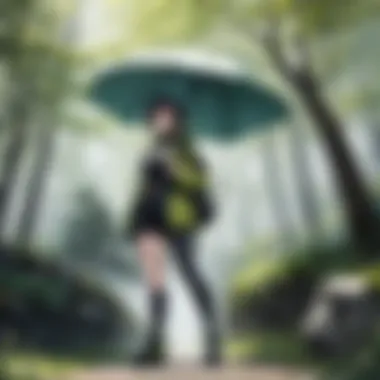Exploring the World of Pokémon Ranger: Gameplay and Impact


Intro
The world of Pokémon Ranger presents an interesting exploration into a unique segment of the Pokémon franchise. Different from the traditional Pokémon games, it offers a blend of adventure, role-playing, and environmental stewardship. Where Trainers capture and battle Pokémon, Rangers focus on protecting nature and the Pokémon inhabiting it. This perspective invites players to consider their relationship with the environment and their responsibilities towards it.
In this article, we will examine the series overview, delve into its themes and motifs, discuss the artistic style and animation, and analyze its cultural significance. By structuring our exploration around these key points, we aim to provide a comprehensive insight into how Pokémon Ranger has carved its niche within both the gaming and anime communities.
Preface to Pokémon Ranger
The introduction to Pokémon Ranger serves as a crucial entry point for readers to grasp the significance of this spin-off series within the broader Pokémon franchise. As a unique offshoot, it presents a distinctive gameplay experience that diverges from the conventional capture-and-battle mechanics typically associated with the main series. This segment outlines the foundational aspects of Pokémon Ranger, highlighting the central themes and gameplay elements that differentiate it from its counterparts. Understanding the role of rangers offers valuable insights into the more profound environmental and storytelling themes that the series cultivates.
Overview of the Franchise
Pokémon Ranger debuted in the gaming world in 2006 as a fresh addition to the Pokémon universe. The franchise revolves around the concept of trainers who act as protectors of the environment and the Pokémon that inhabit it. Unlike traditional Pokémon games, which focus on battling and training Pokémon, Ranger emphasizes interaction and collaboration between trainers and Pokémon. This shift in focus introduces players to a narrative that prioritizes the well-being of Pokémon and highlights their role in maintaining ecological balance.
The game's distinct mechanics and narrative approach allow it to resonate with a broad audience. The Ranger's duty is to thwart the plans of villains, which often involve exploiting Pokémon for selfish ends. By doing so, the franchise not only entertains but also educates players about ecological issues, creating a responsible gaming experience.
Defining the Ranger Role
In Pokémon Ranger, the role of the ranger is multifaceted. Rangers are not merely trainers; they are guardians of nature, entrusted with the protection of Pokémon and their habitats. This character framework offers players a unique perspective, shifting from competition to cooperation. Rangers capture Pokémon not to battle but to use their abilities in various missions, showcasing teamwork over rivalry.
Rangers utilize special tools known as Capture Stylers, which enable them to establish temporary bonds with Pokémon. This mechanic reinforces the theme of connection between humans and Pokémon, promoting respect for these creatures rather than viewing them as objects for personal glory.
Furthermore, the Ranger role encompasses various missions that align with conservation efforts. Each mission requires strategic thinking and a nuanced understanding of Pokémon abilities. Thus, rangers navigate a storyline filled with environmental challenges, making their role significant not just in gameplay but also in fostering awareness about the importance of ecological stewardship.
"Rangers redefine the trainer role by emphasizing teamwork and environmental responsibility, making Pokémon more than just companions in a battle."
In summary, the introduction section sets the stage for a deeper exploration of Pokémon Ranger. By defining the franchise's unique elements and the ranger's pivotal role, readers can begin to appreciate how this series enriches the Pokémon experience while promoting important themes.
Gameplay Mechanics
Gameplay mechanics are a vital aspect of Pokémon Ranger, defining how players interact with the game world. The mechanics determine how players capture Pokémon, complete missions, and utilize various items as well as Pokémon abilities. Each of these elements contributes to an immersive experience that goes beyond traditional Pokémon gameplay. This section will delve into significant aspects like capturing Pokémon, mission structure, and the integration of items and abilities.
Capturing Pokémon
Capturing Pokémon is central to the gameplay in Pokémon Ranger. Unlike the main series games, capturing in this franchise involves a stylus-based mechanic, requiring players to trace circles around Pokémon on the screen. This unique method brings a different level of engagement compared to typical battle mechanics.
The act of capturing reflects the bond between Rangers and Pokémon, emphasizing teamwork and respect for nature. It also encourages players to approach encounters thoughtfully.
Key considerations in capturing include:
- Timing: Knowing when to circle and when to back off can mean the difference between success and failure.
- Strategy: Adapting your approach based on the characteristics of the Pokémon involved adds depth to captures.
- Environmental factors: Certain areas may have wild Pokémon that are easier or harder to capture, influencing gameplay strategy.
By incorporating these mechanics, Pokémon Ranger provides a refreshing take on the capturing motif within the franchise.
Mission Structure
Mission structure in Pokémon Ranger is another important gameplay mechanic, guiding players through various goals and objectives. Missions are often built around protecting the environment, saving Pokémon, or thwarting villainous plots. This distinct focus sets it apart from other entries in the franchise, where battles often dominate gameplay.


Each mission is straightforward, consisting of a clear goal, an area to explore, and specific challenges. Players often have the chance to encounter various Pokémon while completing these missions. It creates a sense of purpose and progression that encourages exploration and interaction.
Some characteristics of the mission structure are:
- Variety: Missions vary significantly in objectives, ranging from rescue operations to puzzle-solving tasks, keeping the gameplay fresh.
- Cooperative design: Many missions necessitate using multiple Pokémon abilities, showcasing teamwork and collaboration.
- Rewards system: Completing missions yields experience, unlocking new abilities and capabilities for players.
This makes the missions engaging and enriching.
Use of items and Pokémon Abilities
In Pokémon Ranger, the use of items and Pokémon abilities enriches the gameplay experience. Items such as capture discs and special gadgets enhance the player's ability to interact with Pokémon and the environment. Meanwhile, the unique abilities of Pokémon can be harnessed in various innovative ways to solve puzzles and complete tasks.
Understanding the benefits and limitations of each item is crucial for optimal gameplay. Some aspects worth noting include:
- Capture discs: These are necessary for capturing Pokémon. Different types are effective against specific Pokémon, requiring players to choose wisely.
- Practical gadgets: Items like the Styler can be upgraded, offering new features that enhance capturing abilities.
- Pokémon abilities: Each Pokémon has its special skill, such as water or fire moves, which can assist Rangers in overcoming obstacles in missions.
Integrating these items and abilities emphasizes the core theme of cooperation and responsibility that is essential throughout Pokémon Ranger.
The rich mechanics of Pokémon Ranger invite players to engage deeply with both the world and its Pokémon, emphasizing a balance between adventure and environmental stewardship.
Narrative Analysis
Narrative analysis in Pokémon Ranger holds significance as it unpacks the intricate layers of storytelling and character interaction present in the series. This analysis serves to illuminate not just the plot, but also the underlying messages and themes that resonate with the audience. The way narratives are constructed influences players' engagement, and in Pokémon Ranger, the narrative is tightly intertwined with the gameplay and the responsibilities of the Rangers. Understanding this analysis can enhance appreciation for both the mechanics and the moral implications of the game.
The Storyline of Pokémon Ranger
The storyline of Pokémon Ranger establishes a unique identity within the Pokémon franchise. The plot centers around Rangers, individuals who safeguard the land and maintain harmony between humans and Pokémon. In stark contrast to traditional Pokémon trainers, Rangers do not capture Pokémon for battles. Instead, they utilize special Capture Stylers to temporarily enlist Pokémon in missions. This essential difference not only redefines the player's role but also advances the narrative. The conflicts often arise from human exploitation of nature or Pokémon, drawing on themes prevalent in modern environmental discourse.
The central narrative revolves around stopping villains who threaten the ecosystem. Each mission presents challenges, often requiring the player to strategize effectively with different Pokémon abilities. The storyline unfolds across various regions, creating a sense of exploration and discovery that aligns with the mission-based structure of the gameplay. By tackling environmental concerns, the narrative invites players to reflect on their real-world implications. Overall, the storyline resonates well with players who appreciate strong themes of conservation and responsibility.
Character Development
Character development in Pokémon Ranger is meaningful as it establishes deeper emotional connections between players and the protagonist, the Ranger. Unlike many other Pokémon games, where the player character is often vague, the protagonist here is equipped with a backstory and personality that evolves throughout the game. This development is complemented by the characters met along the journey, each possessing unique traits and motivations.
Key characters, like the partner Pokémon and supporting Rangers, contribute significantly to the emotional journey. These relationships enhance the narrative and create a team dynamic, which is less about competition and more about collaboration. Players witness characters grow as they face various challenges, making their successes and failures impactful. As the story progresses, players find themselves increasingly invested in the fate of their allies and the environment they protect.
Thematic Elements
The thematic elements in Pokémon Ranger are varied, yet they revolve around essential concepts of environmentalism, cooperation, and responsibility. One of the primary themes is conservation, which is presented as a collective effort between humans and Pokémon. The narratives emphasize that success depends not on dominance, but rather on understanding and mutual respect.
Additionally, the game touches on themes of trust and bonding. The relationship between a Ranger and their Pokémon is based not solely on utility but rather on friendship and shared goals. Each mission not only advances the story but also encourages players to think critically about their own actions towards the environment.
Ultimately, the thematic richness of Pokémon Ranger elevates it beyond mere entertainment. It engages players actively, prompting them to consider their real-world impact and the importance of protecting the natural world.
"The narrative in Pokémon Ranger provides a unique perspective on the bond between humans and nature, highlighting the importance of mutual respect and responsibility."
In sum, the narrative analysis of Pokémon Ranger highlights crucial aspects that enhance the player's experience. By examining the storyline, character growth, and thematic depth, it is clear why this series remains a significant part of the Pokémon franchise, resonating profoundly with fans and new players alike.
Cultural Significance


The cultural significance of Pokémon Ranger is multifaceted, extending beyond mere entertainment. It reflects deeper themes that resonate with players and fans alike, suggesting a unique blending of gameplay, narrative, and societal values. Understanding this significance is crucial for recognizing how Pokémon Ranger contributes to the larger Pokémon universe and gaming culture.
Impact on Gaming Culture
Pokémon Ranger has notably influenced gaming culture since its inception. This series pioneered a new approach to the typical Pokémon gameplay. The focus on capturing Pokémon not through battles but using a lasso-like mechanic changes the dynamics significantly. This aspect of gameplay has inspired similar mechanics in other games, showcasing how innovation in one franchise can ripple through the industry.
Additionally, Pokémon Ranger introduced a narrative-driven structure that emphasizes environmental protection. This narrative choice has encouraged players to engage with themes of conservation and responsibility. Such themes resonate strongly in today's market, where environmental consciousness is increasingly valued.
Environmental Themes
The central theme of environmental stewardship is apparent throughout the Pokémon Ranger series. Players take on the role of people who protect natural habitats and Pokémon from exploitation and harm. This narrative arcs connect to real-world issues related to ecology and conservation. By engaging with these themes, players can reflect on the importance of preserving the environment.
The storyline frequently promotes the idea that humans must coexist harmoniously with nature. The mechanics of the game support this idea, as players work to resolve conflicts while using their abilities and those of the captured Pokémon. This reinforces a strong message about teamwork and collaborative efforts in safeguarding the planet.
Representation of Rangers in Media
Rangers have been presented across various media platforms, enhancing their cultural significance. In addition to the games, they have appeared in manga adaptations and anime, showing that their role extends beyond the virtual world. The portrayal of Pokémon Rangers often emphasizes characteristics like bravery, empathy, and a strong moral compass.
The image of the Ranger in these adaptations frequently aligns them with heroic protagonists that seek to protect both Pokémon and their environment. This representation elevates their status within the Pokémon universe, further solidifying their importance among fans.
Through various forms of media, the Rangers have become symbols of environmental activism and unity between humans and nature, reflecting broader societal values and concerns.
The impact of Pokémon Ranger on gaming culture highlights the importance of conservation and environmental awareness.
Series Evolution
The evolution of the Pokémon Ranger series is crucial for understanding its place within the broader Pokémon franchise. This topic encompasses the development of gameplay mechanics, storylines, and character roles across the titles. Understanding this evolution enhances appreciation for its unique contributions and adaptations, reflecting changing trends in gaming.
Chronological Development of Pokémon Ranger
The Pokémon Ranger series began with its first game, Pokémon Ranger, released on the Nintendo DS in 2006. This initial installment introduced players to a different experience compared to the mainline Pokémon games. Players step into the role of a Ranger tasked with protecting Pokémon and their habitats. The mechanics relied on the capture of Pokémon through a lasso-like technique called the Capture Styler.
The sequel, Pokémon Ranger: Shadows of Almia, released in 2008, expanded on the original’s concepts. It included new Pokémon, a richer storyline, and deeper mechanics. Players could level up their Capture Styler and encounter a more diverse range of missions.
In 2010, Pokémon Ranger: Guardian Signs brought even more innovation. This version introduced the concept of Capture On the Go, allowing players to utilize Pokémon abilities in real-time. Various Ranger teams were introduced, adding depth to the narrative and gameplay. The series encouraged cooperation and showcased the bond between Rangers and Pokémon in dynamic ways.
Comparison with Main Pokémon Series
Comparing Pokémon Ranger with the main Pokémon series highlights distinct gameplay and thematic focuses. While the main series emphasizes traditional turn-based battles and gym challenges, Pokémon Ranger shifts the focus towards environmental protection and cooperative gameplay. In Ranger, capturing Pokémon does not aim at battling but rather serves to assist in missions that protect ecosystems.
The narrative approach also differs. Main Pokémon games often deal with themes of competition and becoming a Pokémon Master, while Ranger emphasizes stewardship and environmental responsibility.
Additionally, the graphics and art style reflect this evolution. Ranger's vibrant environments and character designs stand apart from the more competitive tone of the primary series.
"Pokémon Ranger redefined the franchise by placing emphasis on environmental themes, urging players to connect with nature beyond battles and competitions."
Overall, the evolution of the Pokémon Ranger series showcases its adaptability and lasting impact within the franchise. By examining its chronological development and comparing it with the main series, we can appreciate the unique narrative and gameplay experiences it provides. This offers important insights for fans and newcomers alike.
Fan Community and Reception
The fan community plays a vital role in the success and longevity of the Pokémon Ranger series. This section will explore the significance of community engagement and critical reception. The interaction between fans and the franchise adds layers to the experience, enhancing both enjoyment and understanding of its various elements.
Community Engagement
Community engagement refers to how fans connect with each other and the franchise itself. In the case of Pokémon Ranger, platforms like Reddit and Facebook serve as crucial spaces for discussion and interaction.


Fans share strategies, artwork, and personal experiences. Many join forums to discuss their favorite Pokémon captures or strategize over challenging missions. Engaging in these discussions fosters a sense of belonging among fans and encourages deeper understanding of gameplay tactics. This social aspect cultivates a learning environment where newcomers gain insights from seasoned players.
Additionally, fan art and fan fiction play an essential role. Talented artists and writers contribute to the community by creating content that expands on the Pokémon Ranger universe. Their works often reinterpret characters and scenarios, providing new perspectives that enrich the lore.
"The community continues to evolve with every release, pushing the boundaries of creativity within the Pokémon Ranger universe."
Critical Reception
Critical reception involves how reviewers, both professional and amateur, perceive Pokémon Ranger. This aspect influences public opinion and, consequently, sales and player engagement. Reviews from gaming publications often highlight both strengths and weaknesses in gameplay mechanics, narrative structure, and overall design.
Upon the release of each installment, critics examine various factors:
- Gameplay Mechanics: How enjoyable and innovative are the capturing systems?
- Visual Appeal: Are the graphics and art style appealing to both new and veteran players?
- Narrative Quality: Does the storyline resonate with a wide audience?
Many reviewers have praised the Ranger series for its unique gameplay, which emphasizes capturing Pokémon differently than in the main games. This fresh approach attracts interest and keeps the series distinct. However, some criticism arises regarding repetitive mission structures and certain gameplay mechanics, which may frustrate players.
Overall, criticism helps shape the expectations and desires of the fanbase. When a sizable number of players express dissatisfaction, developers may take feedback into account in future iterations of the franchise. Understanding this dynamic can provide insight into the relationship between the community and the creators.
Ranger Mechanics in Different Media
The exploration of Pokémon Ranger encompasses various adaptations beyond video games. This section delves into the mechanics of ranger roles as they appear in different media. Understanding these interpretations is crucial for comprehending the broader impact of the Pokémon Ranger franchise. It highlights how the essence of rangers transcends gaming to influence manga and anime, establishing a multifaceted representation among fans.
Pokémon Ranger Manga
The Pokémon Ranger manga serves as an extension of the video game narrative, providing insights that the game may not thoroughly explore. Here, characters are fleshed out with detailed backstories and motivations. Through engaging storytelling and vibrant illustrations, the manga emphasizes the ranger's commitment to protecting nature and Pokémon alike. Each chapter often focuses on specific missions that align with the core gameplay of capturing and aiding Pokémon, yet filters this experience through the lens of deeper emotional connections.
In the manga, readers are introduced to various ranger trainees, and their growth becomes central to the plot. This showcases their struggles and triumphs while resonating with the environmental themes inherent in the franchise. The manga also highlights the interaction between rangers and Pokémon, offering a more nuanced view of teamwork and responsibility. While the games outline mechanics, the manga enhances narrative depth and character development.
Anime Adaptations
The anime adaptations of Pokémon Ranger take different approaches to the ranger's role compared to the manga and video games. In these adaptations, the rangers are often portrayed as heroic figures embarking on adventures that center around environmental protection. The episodic structure allows for varied plotlines, making it possible to explore a range of issues like ecological disasters or threats to Pokémon habitats.
In addition, the anime incorporates dynamic visuals and action sequences that appeal to a different audience, notably younger viewers. Characters like Kate and her companions often face challenges that reflect real-world issues, such as poaching or pollution. The anime's portrayal of rangers fosters an understanding of their importance while embedding fun and adventure within these narratives.
The characters and scenarios presented in the anime not only uphold the core mechanics from the games but add layers of complexity for viewers. This creates opportunities for discussions around responsibility and community, encouraging the audience to reflect on their role in environmental stewardship.
"The Pokémon Ranger series captures the balance between adventure and environmental consciousness, ensuring its relevance across various media formats."
Future Possibilities
The prospect of future developments within the Pokémon Ranger series is significant for both fans and the wider context of gaming culture. As interest in environmental themes and creative gameplay continues to rise, Pokémon Ranger remains a unique branch of the Pokémon franchise. Exploring future possibilities allows for speculation regarding new gameplay mechanics, storyline expansions, and the integration of modern technology in gaming.
Speculations on Future Games
Discussions have emerged regarding what the next game in the Pokémon Ranger series could entail. Many fans anticipate a return to the series due to its distinctive role within the larger franchise. Future titles might focus on enhancing the close relationship between Rangers and Pokémon. Expanding the ranger’s abilities could create deeper interaction with environments, such as using Pokémon to influence biomes or mend ecosystems.
Moreover, incorporating augmented reality features could facilitate an immersive experience. Imagine traversing real-world locations to capture Pokémon, turning gameplay into a quest that intertwines with daily life. These speculations showcase the potential evolution of the series in ways that resonate with current gaming trends.
Evolving Roles of Pokémon in Gaming
The role of Pokémon has always been at the core of the franchise, and this evolution reveals intriguing dynamics for the future. As gaming technology advances, Pokémon Ranger can embody newer roles that extend beyond the traditional mechanics. Future developments may include Rangers playing a more significant role in larger narratives or cross-game events that connect different Pokémon titles.
Besides, the ethical implications of Pokémon interaction can also be reassessed. The concept of Pokémon as allies in environmental protection could evolve into a deeper narrative about conservation and responsibility in the gaming world.
In summary, the future of the Pokémon Ranger series holds exciting opportunities for both gameplay and storytelling. The evolution of roles for Pokémon, along with speculative game development, positions the series for renewed interest and relevance in the ever-changing landscape of gaming.



